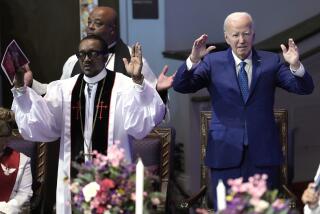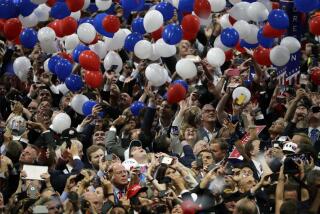Will black voters follow Obama on gay marriage?
President Obama’s conversion from nay to yay on same-sex marriage raises an interesting political question: What happens to his support among black voters who, in most states where the issue has been on the ballot, have been overwhelmingly against it?
In spite of eloquent pleas from NAACP chapters and progressive black clergy, the black electorate remains unmoved. In fact, until his announcement Wednesday, Obama’s views seem to have been shaped by that same community, especially the black church. Why has the black community historically lagged the general population in “evolving” on lesbian, gay, bisexual and transgender issues?
Many analysts cite the conservative theology of most black churches. But historically, homosexuality was a nonissue. Then, in the 2004 presidential election, anti-civil union and marriage equality laws were put on ballots in key states to draw “values voters” to the polls. Part of the Republican strategy was to have white evangelical leaders actively recruit black clergy to the anti-gay movement. For example, the Promise Keepers, the Traditional Values Coalition and other evangelical groups organized meetings of black clergy from Washington to Texas to California to oppose gay marriage.
COMMENTARY AND ANALYSIS: Presidential Election 2012
As important as the church’s role is, this fact remains: A gay rights movement never really happened among African Americans. The fight for civil rights took up almost all of the justice oxygen. For a black person to be “out,” he or she was most likely also out of the black community. Entertainers may be the exception, but they are arguably more a subset of the mainly white entertainment environment, though there is an overlap: Many gay musicians populate the choirs of black churches.
Obama came to black consciousness on the South Side of Chicago and at Trinity United Church of Christ, whose pastor was the Rev. Jeremiah A. Wright Jr. This was the church that helped give Obama his identity as a black person during his development phase. Although Trinity is one of those black congregations affiliated with a mainstream, white denomination (the United Church of Christ is 91% white, according to the Pew Forum on Religion and Public Life), Trinity, under Wright’s leadership, never joined the denomination’s “Open and Affirming” congregations. These churches officially welcome LGBT parishioners.
Although Wright and his church recognized the humanity of gay folks, that did not include advocating marriage equality. That seems perfectly consistent with the position Obama held until last week.
Obama cited his Christian faith as the starting point of his evolution. He found a path through a version of the Bible’s “golden rule” — “treat others the way you would want to be treated” — to support marriage equality for the LGBT community. Interestingly, it wasn’t the church that helped him along that path; it was his family, his friends and his colleagues.
I trust that the president’s views on marriage equality for lesbians, gays, bisexual and transgendered folks will continue to evolve as he grows in his own thinking and, of course, as politics allow. Although Obama has attended different churches since he became president, he’s yet to join one. If and when he does, will he choose an open-and-affirming-style congregation of whatever denomination? And would he oppose a pastor who had not evolved as far as he has?
My hope is that the civil rights movement (of which marriage equality is the latest manifestation) will not stall at the black church door and that the broader black community will evolve along with the president. There is no credible evidence that black voters will abandon Obama this fall. In fact, a recent NBC-Wall Street Journal poll indicates that black support for gay marriage has moved from 32% to 50% since 2009.
The question remains: Will they follow his leadership, and the leadership of the younger generation, who show much more openness to these matters, to grow in support of LGBT equality?
Madison T. Shockley II is pastor of Pilgrim UCC in Carlsbad, an “open and affirming” congregation, and a board member of ProgressiveChristianity.org.
More to Read
A cure for the common opinion
Get thought-provoking perspectives with our weekly newsletter.
You may occasionally receive promotional content from the Los Angeles Times.










